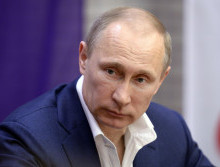
Russian President Vladimir Putin is working with Israel to avoid misunderstandings over Syria. Illustrative. Photo courtesy of the office of the President of Russia.
The Turkish take down of a Russian fighter jet underscored the risk of numerous nations flying fighter jets over Syria—itself in the middle of a number of nations prepared for war. Two of those involved nations have taken close notice, and Israeli Prime Minister Benjamin Netanyahu pointed to the Turkish incident as good reason why his nation is expanding coordinating with Russia over Syria.
Netanyahu talked with Russian President Vladimir Putin during the climate conference in Paris and announced afterwards they had “agreed to deepen the coordination between us in order to prevent mishaps and to do so on a broad basis. I think that every citizen of Israel understands today, in light of recent events on the Turkish border, the great importance of my trip to Moscow and these ongoing contacts with the Russian President.”
Netanyahu’s comments, which were included in a statement published by his office, also said senior military officials from both Israel and Russia were set to meet on Tuesday “in order to continue this policy.”
Russia is fighting rebels and terrorists in Syria, with accusations that they are backing the regime of Syrian President Bashar al-Assad in the nation’s civil war. Israel, meanwhile, is close to the action as the next-door neighbor to Syria and itself has been reported as flying bombing missions in Syria to take out weapons destined for Hezbollah terrorists. In other words, there are plenty of opportunities for Israeli and Russian jets to fly by each other.
President Putin, in comments with Netanyahu released by the Israeli leader’s office, said on Monday they “are satisfied with the progress of bilateral relations” with Israel, saying the military coordination “has been efficient.”
While the two nations are working together to avoid military misunderstandings, it’s doubtful they agree on the fight in Syria—despite a common enemy in ISIS (ISIL). Netanyahu hinted at that disagreement but wanted that to change during his comments with Putin.
Noting that he believes they are “engaged in a big battle against militant Islam,” Netanyahu said this is “another point of contact” with Russia.
“I hope that Israel and Russia can see eye to eye on all the strategic matters, but I want to assure you that we believe that it’s within our powers to have very good coordination on the ground and in the air so that we do not create the kind of problems that we’ve been experiencing,” said the Israeli leader.
“I’m very satisfied by the fact that our militaries have been very careful to coordinate with one another and will continue to do so.”
(By Joshua Spurlock, www.themideastupdate.com, November 30, 2015)
